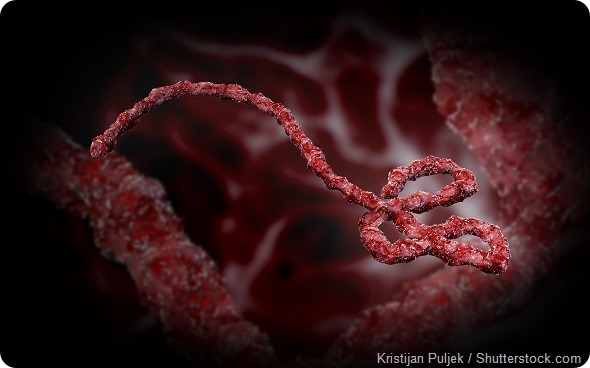A case report, published in The Lancet today, describes the successful treatment of Ebola using a new drug under clinical development for vascular leakage (FX06, a fibrin-derived peptide).
Having shown efficacy in reducing vascular leakage and its complications in mice with Dengue haemorrhagic shock, FX06 began trials in man. To date, FX06 has been shown to be safe for use in humans, and a recent study showed it to be effective in the prevention of reperfusion injury in patients who have suffered myocardial infarction.
A 38-year old Ugandan doctor contracted Ebola in Sierra Leone, where he was in charge of an Ebola virus treatment unit. Five days after testing positive for the Ebola virus, he was airlifted to Frankfurt University Hospital and admitted to a specialized isolation unit to undergo aggressive intensive-care treatment.
Signs of vascular leakage and severe multi-organ failure (including the lungs, kidneys, and gastrointestinal tract) soon became apparent. Artificial ventilation and kidney dialysis were initiated and the doctor was administered antibiotics together and a course of the experimental drug FX06.

This management strategy of combined intensive care and drug treatment led to a marked improvement in the doctor’s vascular and respiratory functions. He was monitored for a further 30 days. Blood tests were then found to be negative for Ebola virus genetic material. The patient had overcome the Ebola virus and was released from hospital.
Dr Wolf explained:
Even though the patient was critically ill, we were able to support him long enough for his body to start antibody production and for the virus to be cleared by his body’s defences.
Professor Zacharowski commented:
In terms of improving treatment for Ebola patients, we have shown how intensive care medicine can successfully be applied under strict isolation conditions.
The authors believe that clinical trials of FX06 in the treatment of Ebola infection are justified.
Sources
Wolf T, et al. Severe Ebola virus disease with vascular leakage and multiorgan failure: treatment of a patient in intensive care. The Lancet 2014. Epub ahead of print. Available at: http://www.thelancet.com/journals/lancet/article/PIIS0140-6736(14)62384-9/abstract